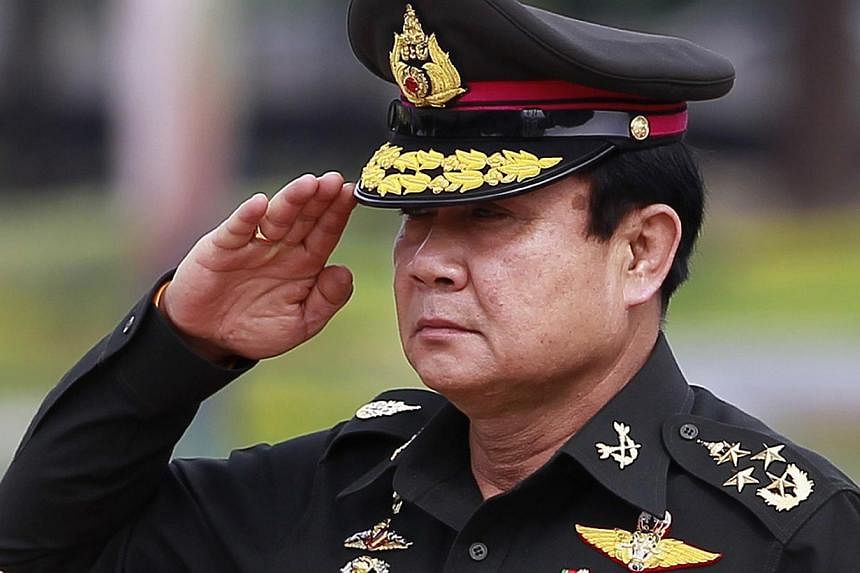BANGKOK (Reuters) - Thailand's junta wants to sell a positive story about its coup saving a troubled economy from recession, and while it seems to have business on board there is little evidence yet of a sustainable, broad-based recovery.
A plethora of Thai companies shared the military government's optimism in recent earnings reports, looking to improved conditions after the May 22 coup ended six months of protests that paralysed the government and bureaucracy.
Southeast Asia's second-largest economy avoided recession by growing 0.9 per cent in April-June from the previous quarter, when it shrank a revised 1.9 per cent, data showed this week. But the tentative recovery is some way from matching the government spin.
The state planning agency slightly trimmed its full-year forecast but expects a V-shaped rebound by December on rising consumer and business confidence and political stability. It has predicted 4 per cent growth in the second half after a 0.1 per cent contraction in the first.
Public spending, consumption and agriculture have picked up, but manufacturing, private investment, exports and tourism remain weak, official data show. And, though the military government has vowed to fast-track major infrastructure projects, the benefits of such spending may not be seen until 2015 or later.
Gundy Cahyadi, economist with DBS Bank in Singapore, said higher exports, factory output and capacity utilisation were needed to signal the economy was on a sustainable recovery.
"The most important is to show that they are open for business and that they are serious about their pro-growth policies," he said, referring to the military leaders. "Yet, returning to the 5 to 5.5 per cent medium-term growth potential requires more time."
There are some positive signals. Consumer confidence has risen since the coup, having fallen for 13 months previously, and businesses think stability will boost their bottom lines.
The junta has cleared delayed payments to rice farmers, and approved infrastructure projects and private investment applications that had been halted by the unrest.
Spending to drive economic growth is also on the cards. In the government's budget for the year starting Oct 1, nearly 18 per cent of planned spending of 2.58 trillion baht ($100.8 billion) is earmarked for investment. The GDP data showed investment fell an annual 6.9 per cent in the June quarter.
The country's second-biggest builder Ch Karnchang expects infrastructure spending to boost its revenues, despite uncertainties over official budget disbursements.
Hotel and fast-food chain operator Minor International expects its hotel occupancy rate to be at least 70 per cent for 2014, even though it fell to 60 per cent in the second quarter.
With some stabilisation in economic activity, momentum is expected to steadily pick up going forward.
The Bank of Thailand has forecast economic growth of 1.5 per cent for this year, about half its earlier forecast, before a robust expansion of 5.5 per cent for next year.
Thammarat Kittisiripat, senior economist at TMB Bank, which is 26 per cent owned by the Finance Ministry, sees a "V-shaped" recovery in the second half due to improved consumer and business sentiment. He predicts growth of 2 per cent for 2014.
Benjamin Shatil, economist with JP Morgan in Singapore, said while he is positive on Thailand's outlook, "the next test for the economy will rest on how much progress the military administration can make on the infrastructure spending plan."
"An increase in public infrastructure investment will give legs to the tentative recovery in the economy," he said.
Despite positive GDP growth, some pillars of the economy are wobbling - consumption remains subdued and exports and tourism are still weak.
Household spending rose an annual 0.2 per cent in the June quarter, but high household debt levels could constrain any significant pick-up.
Auto sales in July fell 30 percent from a year earlier, having declined since mid-2013 following the end of a government subsidy.
Tepid exports have hit factory output and capacity utilisation, which was at 59.5 per cent in the second quarter, the lowest in the past 10 quarters.
Tourism, which accounts for about 10 percent of GDP, is still depressed. In July, the number of tourists fell by 11 per cent from a year earlier after June's 24.4 per cent slump.
"The details suggest this improvement was not broad-based and is low quality," Nomura economists wrote in a report after the GDP data, noting that improved private consumption was partly driven by one-off payments to farmers in the rice scheme.

